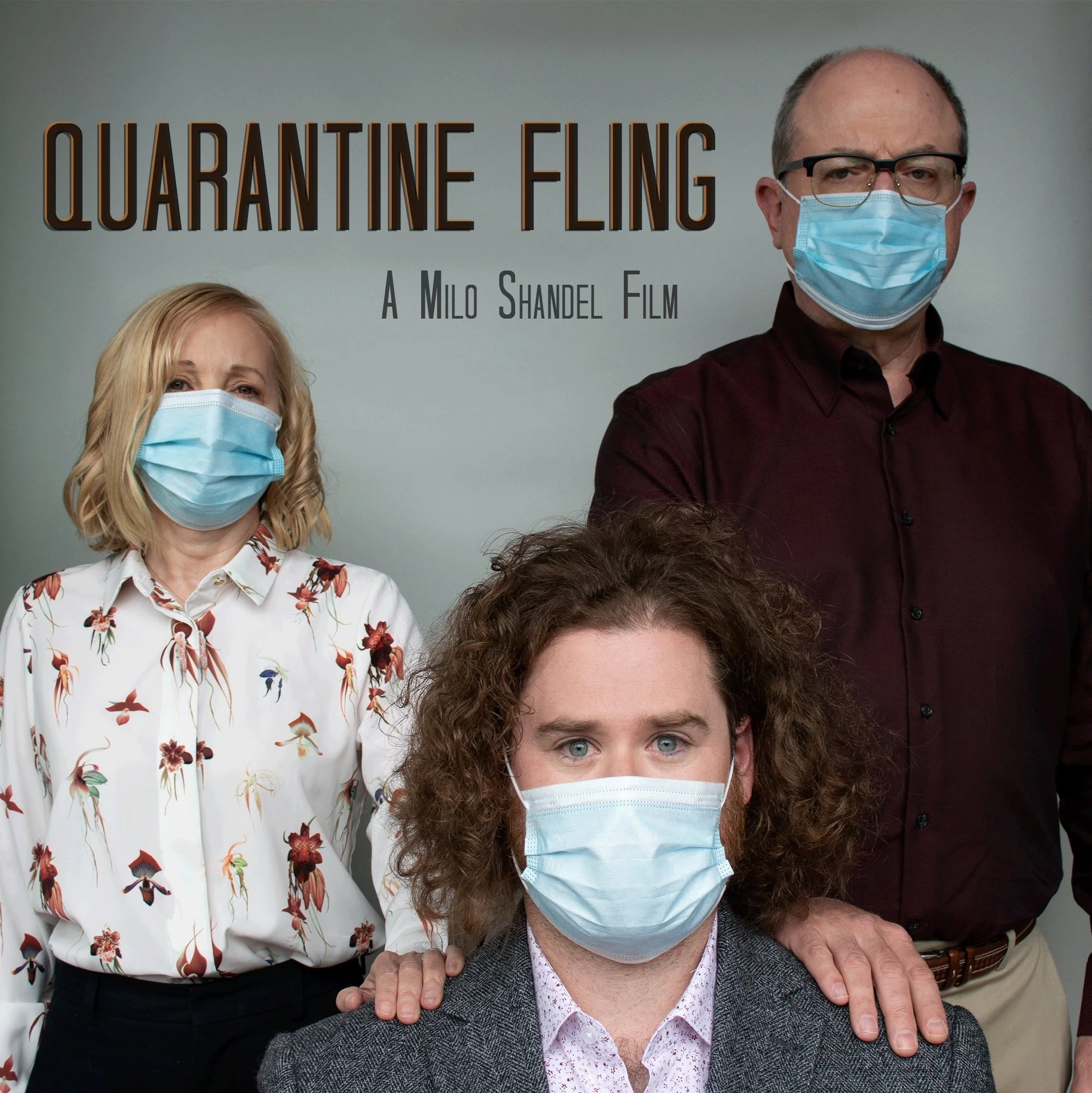From the comedic to the poetic, Vancouver Short Film Festival's brief takes on the pandemic
Local entries Tomomi on the Farm, Who the Hell Is Nigel?, and Quarantine Fling capture the inspiring and the absurd
Who the Hell Is Nigel?
Quarantine Fling
Tomomi on the Farm
The Vancouver Short Film Festival runs online from January 28 to February 6
THE PANDEMIC HAS offered a rich source of inspiration for several entries featured at this year’s Vancouver Short Film Festival—and the range of moods, from poetic reflection to absurd comedy, capture the roller-coaster of emotions COVID times have brought.
We talked to three local filmmakers who channelled the surreal experience of quarantines, online relationships, and daily briefings into taut looks at tough but transformative times. You can catch their work, and about 50 other short films, at the all-online fest from January 28 to February 6.
Tomomi on the Farm
WHEN THE WORLD shut down in March 2020, director Craig Range and his wife Tomomi Kato, who had worked as a sushi chef at Rogers Arena, decided to spend lockdown at his parents’ remote elk ranch in tiny Livelong, Saskatchewan. She had lost her job, and film work had come to a halt in Vancouver, so they packed up and left.
Range brought along his camera, capturing their six-month stay from the shocking arrival from warm Vancouver spring to minus-15-degree Saskatchewan through to planting a vegetable garden and watching the farm come alive during long summer days.
The result is a beautifully impressionistic look at the change of seasons on the Prairies, and at his wife’s adjustment to the rhythms of the ranch’s foreign surroundings.
“That feeling of being so far away from life before: in some ways that dovetailed with the whole Covid experience. We all felt isolated and in unknown territory,” Range tells Stir over the phone from Calgary. “She became more and more comfortable with the place and the surroundings. That period of everything shutting down and that period of introspection were transformational for a lot of people.”
Arriving in the snow from the West Coast, the couple must hole up for two weeks of quarantine in Range’s grandfather’s old house, which still sits on the land that goes back four generations in his family. We see Kato connecting with her family in Japan, missing them and worried about their well-being.
Range, who grew up on the elk farm but had not spent a block of time there in many years, began to see it in new ways. The poetic film features imagery of dead corn rustling above the crust of snow, vast blue skies, swaying birch trees, and stream water trickling across dirty roads during the spring melt. The film’s most indelible images take place at dusk, giving a golden, dreamlike quality to the couple’s months of limbo.
“I love the feeling of the light at dusk, especially in the summer, when the light lasts longer than it does in other places,” says Range. “It feels heavenly there. Something I really miss about the Prairies is the afternoon light, and something about the big sky and the way the clouds are there. I couldn't shoot enough of it.”
Who the Hell Is Nigel?
FOR ANYONE who saw it on March 16, 2020, Dr. Bonnie Henry’s press conference amid the chaos of a pandemic descending rapidly on the world was unforgettable. She implored the thousands of travellers rushing home to quarantine, and announced the shutdown of large gatherings. It wasn’t just memorable for her calm amid a storm of uncertainty, but for the animated, deeply expressive ASL interpreter who stood by her side.
Images of Nigel Howard’s ASL interpretations for Covid briefings in British Columbia started to go viral on social media–viewers saying they were “riveted” by the passion and expressivity he brought to the briefings. And a local filmmaker—also, coincidentally, named Nigel, in this case Nigel Edwards—and his team recognized there had to be more to his story.
Building a documentary around Howard was a huge learning experience for Edwards, who had never met a deaf person and didn’t know much about the deaf community.
“He was bringing levity to something quite dark [at the briefings] and that was the initial launch-off point,” Edwards says. “Him being in the room as an interpreter: that had a huge impact for the deaf community to have someone communicating in their native first language, in-person.”
Howard ended up having much more to say—not just in terms of his own life story, but about his own activism around ASL. In Who the Hell is Nigel?, Edwards spends a taut 26 minutes tracing Howard’s growing-up years here, at first trying to assimilate into the hearing community and resisting signing, and then awakening to deaf culture in his late teens, going on to advocate for ASL interpreters at institutions like UBC.
Throughout, Edwards interviews everyone from Howard’s parents to former swimming coaches and deaf community activists. At Howard’s request, Edwards provides not just captioning but live, split-screen ASL by different interpreters for every hearing person who appears; each deaf subject signs and has captions and different actor-voice-overs as well.
Late in the film, in its most poignant scene, “Dr. Bonnie” herself appears, reading an interpretation of Howard’s own words.
“The reason why she was interested in getting involved was it was not about her, and because she had worked with Nigel over the past year,” Edwards explains.
The entire experience has changed Edwards’ outlook, not just on filmmaking but on inclusion in the world in general. He’s thrown out old assumptions—for instance, the idea that all deaf people can lip read. And he’s learned that you can tell stories on film in more visual ways that can reach viewers without a fast flurry of words.
“Being intentional is a huge outcome, talking to someone directly and taking the time to communicate the ideas that are coming up—as opposed to as filmmakers we’re constantly running around on set with a coffee in one hand and trying to put out fires with the other hand,” says Edwards.” Just trying to slow down and be intentional: I think that was one of the biggest thing I took away from the project.”
Quarantine Fling
FILMMAKER MILO Shandel says it’s true: his comedic new short about a dude who enjoys extended lockdown a little too much grew out of a Tweet—specifically, a joke posted by his friend and screenwriter Natty Moher late last spring.
“He basically said: ‘Pitch for a rom-com: Young man makes up fake live-in girlfriend to keep parents out of his bubble,’” Shandel relates. “It all came together very fast, where all the pieces fell into place.”
Wrapping up the shoot by late summer, when BC was starting to open up again, Shandel had a brief wave of worry. “It’s funny, because I was concerned as we got close to delivering, like, ‘Is this going to be a nostalgia piece?’” he says, laughing about the way the world’s now back in lockdown with a fifth-wave variant. “Don’t get me wrong: I would be more than happy to have an out-of-date release on my hands!
“I do believe you gotta be able to laugh at stuff,” he adds. “My rule of comedy is it's never too soon.”
One of Quarantine Fling’s big draws is its killer comedy-scene cast. Kelsey Flower is a warped standout as Nate, the short’s shaggy-haired, robe-and-boxers-wearing couch potato.
“He has this really great quality of just being on the edge of saying ‘Oh fuck it’—that nice kind of exasperated quality,” observes Shandel. “And then there’s just the Rube Goldberg-esque scenarios he was willing to go to.”
In the film, Nate’s technology-challenged parents (Corner Gas dream team and real-life husband-and-wife Brent Butt and Nancy Robertson) are constantly Facetiming him, so worried about their son spending lockdown alone that they urge him to move home. To avoid that hell, Nate invents an imaginary live-in quarantine girlfriend who comes to life through an elaborate array of props and social-media tricks. When he needs more help, he reaches out to your friendly neighbourhood blowup-doll warehouse, where Vancouver indie-comedy favourite Ryan Beil is the creepy resident manager.
The situation becomes more and more absurd—speaking directly to how surreal extended lockdown was, not to mention how batshit everyone went. Shandel perhaps best captures the feeling of limbo in the bold timeline intertitles, which start out straightforwardly (“Quarantine: Day 10”) and give way to existential chaos (“Quarantine: Time Has Lost All Meaning!”).
If there’s anything serious that Shandel wants to get across with this much needed slice of pandemic levity, it’s that there’s huge untapped potential for Vancouver’s comedy scene in the realm of short films.
“I really wanted to utilize the comedy community in Vancouver,” he says, pointing to the wealth of indie comedy nights, like Beil’s Sunday Service improv troupe, here. “And we’ve got the talent behind the camera to make it happen. There are a lot of short film festivals in the US–and we just won best short at the European Short Film Festival. But I feel like in Canada we need to have more platforms.”
















